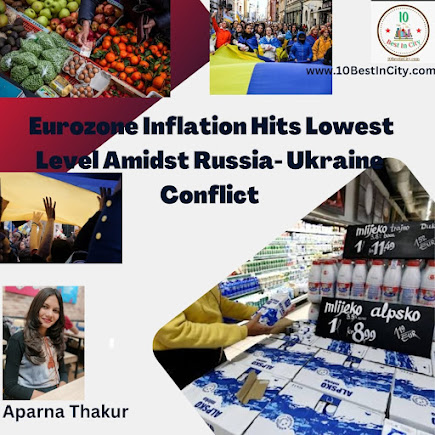Eurozone Inflation Hits Lowest Level Amidst Russia- Ukraine Conflict Aparna Thakur
The Eurozone has been facing significant economic challenges due to the ongoing Russia-Ukraine conflict. As a result, the region has experienced a sharp decline in inflation, reaching its lowest level in recent years. This case study examines the impact of the conflict on the Eurozone's inflation and highlights the key factors contributing to this decline.
The Russia-Ukraine conflict has had far-reaching consequences for the global economy, particularly for Europe. The Eurozone, which comprises 19 member states sharing the euro as their common currency, has been directly affected by the conflict due to its geographical proximity and economic ties with both Russia and Ukraine.
One of the most noticeable effects of the conflict on the Eurozone has been the decline in inflation. Inflation is a key economic indicator that measures the rate at which prices of goods and services are rising. A moderate level of inflation is generally considered beneficial for economic growth, but a sudden drop can indicate underlying economic instability.
In the midst of the Russia-Ukraine conflict, the Eurozone has witnessed a significant decrease in inflation. This can be attributed to several factors. First, the conflict has disrupted trade flows between the Eurozone and Russia, leading to a decrease in imports and exports. The resulting decline in economic activity has put downward pressure on prices, as businesses have reduced their production and lowered prices to stimulate demand.
Second, the conflict has caused a decrease in investor confidence and increased uncertainty in the Eurozone. Investors are hesitant to make long-term commitments and are instead opting for safer investment options. This has led to a decrease in investment, which further dampens economic activity and contributes to lower inflation.
Third, the Russia-Ukraine conflict has also had an impact on energy markets. Europe heavily relies on Russian natural gas supplies, and any disruption in the energy sector can have significant consequences for the region. The conflict has led to concerns about potential disruptions in energy supplies, which has put downward pressure on energy prices. Since energy is a key component in the production of goods and services, lower energy prices have translated into lower overall inflation in the Eurozone.
The Russia-Ukraine conflict has had a profound impact on the Eurozone, particularly in terms of inflation. The region has experienced a significant decline in inflation due to disruptions in trade flows, decreased investment, and concerns about energy supplies. This case study highlights the interconnectedness of global economies and the vulnerability of the Eurozone to geopolitical tensions. As the conflict continues to unfold, it will be crucial for policymakers to address these challenges and implement measures to stimulate economic growth and stabilize inflation levels in the Eurozone.
Aparna Thakur
(Fin-Tech manager)
10bestincity@gmail.com
aparna10bestincity@gmail.com
www.10BestIncity.com
Linktree: https://tr.ee/lIJZgVTJo1
LinkedIn: www.linkedin.com/in/
aparna-thakur08
Instagram:https://instagram.com/aparna6928?igshid=ZGUzMzM3NWJiOQ==
Facebook:https://www.facebook.com/profile.php?id=100009335861292&mibextid=ZbWKwL
YouTube:https://www.youtube.com/@10BestInCity
Email: info@10bestincity
https://www.portrait-business-woman.com/2023/05/aparna-thakur.html
#inflation #eurozone, #business, #gold, #money, #news, #eating #bitcoin #investment,#fat, #covid ,#invest, #trading, #cryptocurrency, #investing, #finance, #balloons, #financialfreedom, #crypto ,#btc ,#bbw
@HSBC@BNP Paribas@Credit Agricole@Banco Santander@Adria Bank @Deniz Bank @Erste Bank @Europen American Investment Bank
@Shekhar Gupta @ 10 Bestincity @Aparna Thakur


No comments:
Post a Comment